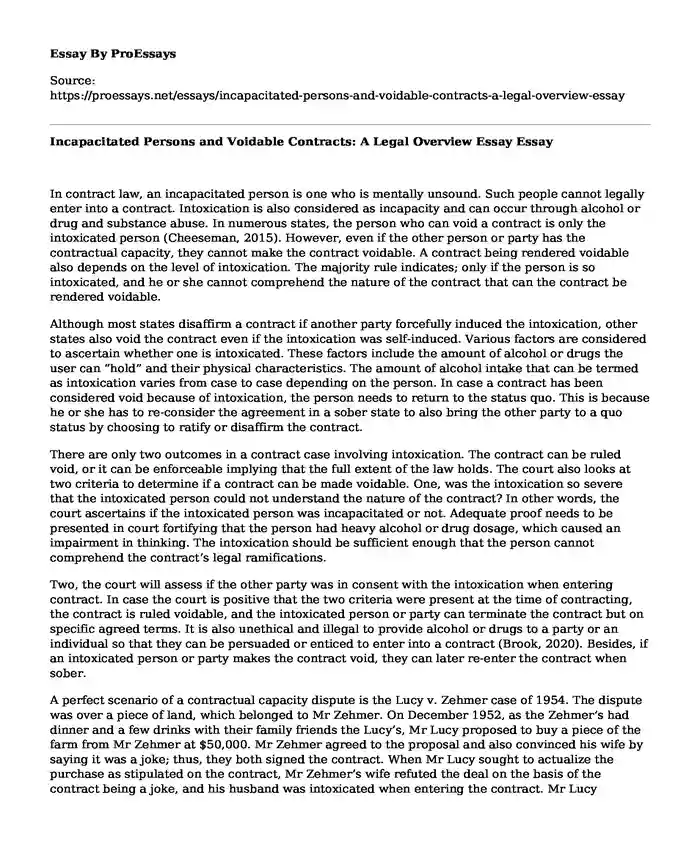In contract law, an incapacitated person is one who is mentally unsound. Such people cannot legally enter into a contract. Intoxication is also considered as incapacity and can occur through alcohol or drug and substance abuse. In numerous states, the person who can void a contract is only the intoxicated person (Cheeseman, 2015). However, even if the other person or party has the contractual capacity, they cannot make the contract voidable. A contract being rendered voidable also depends on the level of intoxication. The majority rule indicates; only if the person is so intoxicated, and he or she cannot comprehend the nature of the contract that can the contract be rendered voidable.
Although most states disaffirm a contract if another party forcefully induced the intoxication, other states also void the contract even if the intoxication was self-induced. Various factors are considered to ascertain whether one is intoxicated. These factors include the amount of alcohol or drugs the user can “hold” and their physical characteristics. The amount of alcohol intake that can be termed as intoxication varies from case to case depending on the person. In case a contract has been considered void because of intoxication, the person needs to return to the status quo. This is because he or she has to re-consider the agreement in a sober state to also bring the other party to a quo status by choosing to ratify or disaffirm the contract.
There are only two outcomes in a contract case involving intoxication. The contract can be ruled void, or it can be enforceable implying that the full extent of the law holds. The court also looks at two criteria to determine if a contract can be made voidable. One, was the intoxication so severe that the intoxicated person could not understand the nature of the contract? In other words, the court ascertains if the intoxicated person was incapacitated or not. Adequate proof needs to be presented in court fortifying that the person had heavy alcohol or drug dosage, which caused an impairment in thinking. The intoxication should be sufficient enough that the person cannot comprehend the contract’s legal ramifications.
Two, the court will assess if the other party was in consent with the intoxication when entering contract. In case the court is positive that the two criteria were present at the time of contracting, the contract is ruled voidable, and the intoxicated person or party can terminate the contract but on specific agreed terms. It is also unethical and illegal to provide alcohol or drugs to a party or an individual so that they can be persuaded or enticed to enter into a contract (Brook, 2020). Besides, if an intoxicated person or party makes the contract void, they can later re-enter the contract when sober.
A perfect scenario of a contractual capacity dispute is the Lucy v. Zehmer case of 1954. The dispute was over a piece of land, which belonged to Mr Zehmer. On December 1952, as the Zehmer’s had dinner and a few drinks with their family friends the Lucy’s, Mr Lucy proposed to buy a piece of the farm from Mr Zehmer at $50,000. Mr Zehmer agreed to the proposal and also convinced his wife by saying it was a joke; thus, they both signed the contract. When Mr Lucy sought to actualize the purchase as stipulated on the contract, Mr Zehmer’s wife refuted the deal on the basis of the contract being a joke, and his husband was intoxicated when entering the contract. Mr Lucy involved the authorities for the enforcement of the contract, and the court found the contract valid because the actions of the defendant were beyond reasonable doubt for someone to believe that a contract was intended. (Washington University School of Law, 2017)
Conclusion
In conclusion, one cannot enter into a contract when intoxicated to the point of being incapacitated even if the intoxication was self-induced. However, if a person is intoxicated but can still comprehend the nature and ramifications of a contract, he or she has the contractual capacity to enter the contract legally as illustrated above.
References
Cheeseman, H. R. (2015). chapter 11 capacity and legality. Contemporary business law (8th ed., p. 254). essay, Pearson.
Washington University School of Law. (2017, July 31). Case Study: Lucy v. Zehmer. Case Study: Lucy v. Zehmer - Blog | @WashULaw. https://onlinelaw.wustl.edu/blog/case-study-lucy-v-zehmer/.
Brook, J. (2020, February 7). Can a Drunk Person Enter into a Contract? CEB. https://blog.ceb.com/2017/08/18/can-a-drunk-person-enter-into-a-contract/.
Cite this page
Incapacitated Persons and Voidable Contracts: A Legal Overview Essay. (2023, Oct 29). Retrieved from https://proessays.net/essays/incapacitated-persons-and-voidable-contracts-a-legal-overview-essay
If you are the original author of this essay and no longer wish to have it published on the ProEssays website, please click below to request its removal:
- Law Essay Example: Police Pursuit of Criminals
- Cannabis and Adolescent Essay
- Goal for Publishing the Letter From Birmingham Jail Essay
- Research Paper on Should 'Mental Harassment' in a Conjugal Relationship Be a Criminal Offense?
- Paper Example on Criminal Investigation: Balancing Privacy and Law Enforcement
- Paper Example on Amelia Dyer: Notorious Female Serial Killer
- Report Example on Same-Sex Marriage & Masterpiece Cakeshop: A Religious Standoff







